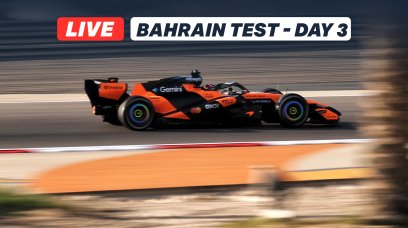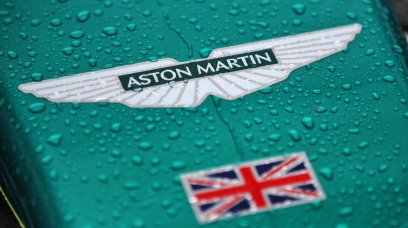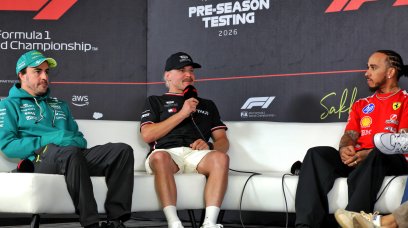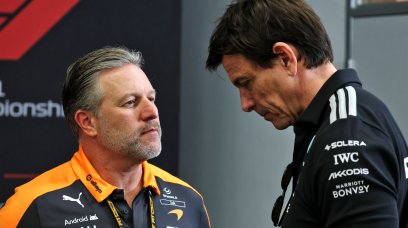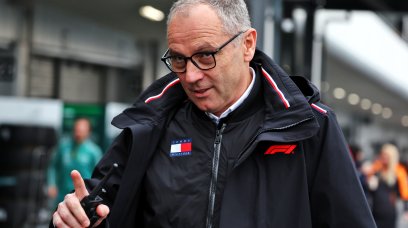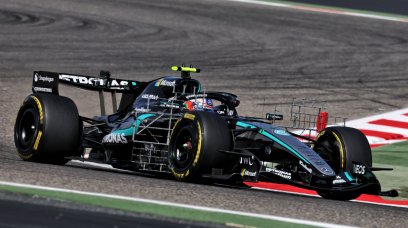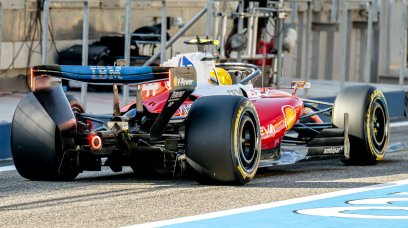Formula 1 teams are obviously keen on their privacy and therefore will not readily let anyone into the pit box during a Grand Prix. A few celebrities may briefly enter the back of the box during race weekends, but the rest of the garage remains inaccessible territory. However, Shell made an exception for RacingNews365.com by allowing us to visit the famous 'Track Lab', Shell's laboratory in the middle of Ferrari's garage box, during the Abu Dhabi GP. This gave us a unique opportunity to speak with Carlos Sainz and Valeri Loreti (Motorsport Delivery Manager of Shell). Loreti, along with two colleagues, is present at every GP to make sure everything is in order with the fuel and oils Shell supplies to Ferrari. The prominent location of the lab in the middle of the garage box shows how important the partner is to Ferrari. "In our lab, we are constantly checking the oils and fuel during an F1 weekend. By doing that, we can guarantee that everything is in order and that the drivers can perform optimally with the cars," Loreti explained in a brief description of the Shell team's main task during a Grand Prix. "We constantly take samples and keep checking that everything is okay. The engineers can then use our data to make adjustments or in an extreme case, for example, make the decision to change an engine." In fact, in the samples taken, the lab team can see if something is wrong with the engine. "When we see some strange things in the samples, we can determine with the engineers where these substances come from and what in the engine is not functioning properly, for example. So in an extreme case, you can see that a certain part is breaking down and a decision has to be made on that whether this part or even an entire engine has to be replaced." It's pretty impressive to see the efficiency and what can be learned from the samples. Once again it shows how strong technology is in Formula 1. That technological strength also continues to affect the normal cars we see back on public roads. "We have been working with Ferrari for more than 70 years and it is an intensive collaboration where we invest an immense amount in the development of the fuel and the oil. So our cooperation is much more than putting a sticker on the car. That ensures that the normal customer also benefits from this collaboration," Loreti elaborates on the partnership between the iconic brands.
"Everything we learn in Formula 1 we bring back to our development centres in Hamburg and Amsterdam, for example. For example, we introduced Shell V-Power and the knowledge to develop that fuel we gained in Formula 1. The fuel we currently use in F1 is only used for the F1 cars, but the concept of the fuel is very close to the fuel you fill up at our gas stations. In the end, Shell V-Power race fuel contains 99 per cent of the sames types of compounds as Shell V-Power road fuel." An impressive figure that was proven in the past by Ferrari with a unique test. In fact, back then they had an F1 car run on regular Shell V-Power fuel and in the process the car was only one second slower than when it ran on the specialised F1 fuel. "On the track, of course, one second is a big difference," Loreti laughs. "But when you look at how relatively little the difference is because the ingredients are so close together, it shows how important development in F1 is for the normal consumer." By 2026, Formula 1 wants to drive with 100 per cent sustainable fuel. A big step, considering that the cars were driving with 10 per cent bio ethanol fuel in 2022. So the fuel suppliers in the royal class of motor racing have to make a big step, but according to Loreti, Shell will succeed in making that step. "We are working incredibly hard with Ferrari to experiment with new fuels and I feel that we are going to experience a 'game changer' moment in the next few years. We are working incredibly hard on that both on the tracks and in the different labs we have. "Of course I can't go into too much detail yet, but we have been working for years to develop this new fuel and we are getting closer and closer to the moment when we can race with 100 per cent advanced sustainable fuel. "That fuel, by the way, will not consist of just one component, but will be made up of different substances. It will be up to us to develop the right formula in the coming years and our collaboration with Ferrari, among others, will help us with that," said Loreti, who is happy to explain what testing procedures look like at the moment.
"Testing is incredibly important and we will continue to do so in the coming years. We have also gone through a major development in terms of assessing samples. First we could process about 15 samples at a time, by testing them in the lab and on the engine. Now new, innovative digital simulation systems allow us to analyse a million options over a year, and that has really been a game changer. "We managed to do that by developing a data tool that can help process the data even faster. This has made the process much more efficient, making on-site testing less important," Loreti proudly explains of the developments at Shell. The efficient system also helps the Lab team on location during F1 races. "The great thing about working on location is that an immense number of things happen that can change situations. So with that, it helps to be able to work even more efficiently, to solve problems even faster. "We are also contributing to the future of the world by doing our bit for the development of advanced sustainable fuels. That makes us proud, just as it makes me proud to work for Shell." Loreti is Italian and then logically had only one dream in mind. "It was not only my dream to one day work in Formula 1, but also to work with Ferrari. Every time I put on the shirt of Ferrari it fills me with pride. So I think in 2022 the moment for me was Charles Leclerc's victory in Melbourne. "You stand there under the podium and then you enjoy knowing that you contributed to that wonderful victory with the team. That gives you a lot of satisfaction and pride and you do it for those moments."
Most read
